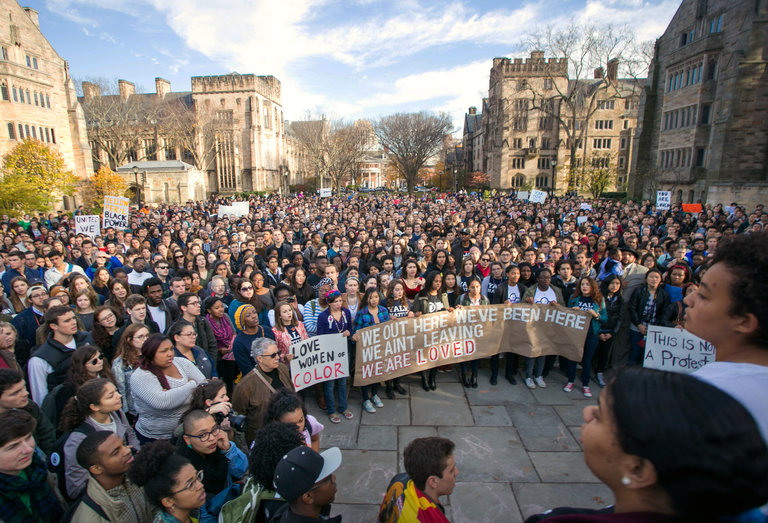
NEW HAVEN — Last November, Scott C. Johnston, a 1982 Yale graduate, was attending a conference organized by the William F. Buckley Jr. Program at his alma mater when student protesters disrupted it. Soon after, he watched an online video of a black Yale student hurling imprecations at a professor who headed her residential college for failing “to create a place of comfort and home.”
Such protests have prompted Mr. Johnston and other alumni to cease funding what they see as coddled children and weak-kneed administrators. “I don’t think anything has damaged Yale’s brand quite like that” video, he said. “This is not your daddy’s liberalism.”
More than a brand, however, a college has a mission: to teach young people the arts and disciplines of open inquiry and expression. That mission has just been reaffirmed in a University of Chicago letter to incoming freshmen that rejects “trigger warnings” about discomfiting course material, “safe spaces” for the hypersensitive and cancellations of invitations to controversial speakers.
But it isn’t the protests per se that damaged open inquiry and expression, but the frenzied way they have been portrayed by the right. The video that so angered Mr. Johnston was shot by Greg Lukianoff, president of the Foundation for Individual Rights in Education, which the Daily Caller then reposted under a headline, “Meet the Privileged Yale Student Who Shrieked at Her Professor,” with photos of her and her parents’ suburban Connecticut home.
What the video didn’t show were the hundreds of white students having their first frank conversations about race with minority classmates. A thousand students of all colors joined a vibrant campus “march of resilience” — I know, because I was on campus last fall. Another thousand convened in the chapel to hear classmates and professors speak from their deepest humanity, without malevolence or duplicity. Free speech and open inquiry are alive and well on campus.
But today’s conservative “free speech” campaign doesn’t want you to know that. What motivates it is not the defense of free speech, but an ideology that condemns “politically correct” activists and administrators and dubiously recommends “free markets” as the best guarantors of such rights. “Our colleges and universities, though lavishly funded and granted every perquisite which a dynamic capitalist economy can offer, have become factories for the manufacture of intellectual and moral conformity,” thundered Roger Kimball, board chairman of Yale’s Buckley Program, at a black-tie dinner that the program sponsored last year in New York.
If anything, the real threat to free inquiry isn’t students, but that same market imperative that First Amendment defenders claim to hold dear. Most university leaders serve not politically correct pieties but pressures to satisfy student “customers” and to avoid negative publicity, liability and losses in “brand” or “market share” — terms that belong in corporate suites but appear, increasingly, in deans’ offices.
Such obfuscation is nothing new. In 1953, Buckley, whose book “God and Man at Yale” urged alumni to roll back professors’ godless socialism, helped found the Intercollegiate Studies Institute to train students to counter “liberal” betrayals of “our nation’s founding principles — limited government, individual liberty, personal responsibility, the rule of law, market economy.”
Today wealthy donors back groups like the Intercollegiate Studies Institute: the Bradley Foundation, the Scaife family foundations and the Koch brothers’ DonorsTrust ( for donors who don’t want to go public) that funnel money to, among others, the David Horowitz Freedom Center (whose “academic bill of rights” would monitor professors’ syllabuses for “balance”) and Campus Watch, which tracks comments on the Middle East.
The Foundation for Individual Rights in Education, which has won more than $1 million from the Bradley Foundation and half a million dollars from DonorsTrust, claims to be standing up for traditional liberal values. Its enemies are the campus Jacobins, who, it claims, are destroying the “marketplace of ideas” that alumni remember so fondly.
Conservatives used to remind us that what the Constitution protects in speech, civil society modulates; freedom requires self-restraint and respect for others, not the hurling of scare words. Yet now their selectively legalistic “free speech” strategy helps turn collegial contentions into rhetorical battlefields by hyping and even provoking progressive offenders.
The reason is that conservatives’ yearning for ordered liberty is being debased not by liberals but by the casino-like financing and predatory lending and marketing of a “dynamic capitalist economy.” Think of Donald J. Trump’s “free speech” rampages (with attacks just like the Foundation for Individual Rights in Education’s on “political correctness”), the Senate’s lockjaw against open hearings, and market-driven entertainment that encourages real violence. Shaming undergraduates who are upset by all this and assailing deans who must cope with them have a chilling effect on “no strings attached” alumni generosity like Mr. Johnston’s, which shielded free inquiry from donors with more mercenary and ideological agendas.
A college is a civil society on training wheels. Students, away from home and in an “adult” society for the first time, may try out defensive ethno-racial flag waving, religious and political dogmas, athletic and fraternal self-segregation, and premature career-ladder climbing. They may scare one another a little, but they also learn to stand up for themselves.
If collegiate civil societies are lurching into ditches as often now as the “free speech” campaign claims, that’s partly because the larger society is, too. Yes, some students are as intemperate as the Republican presidential nominee, and some deans accommodate them. Their behavior may not be your daddy’s liberalism, but what their outraged critics are selling isn’t his conservatism, either.
Correction: September 3, 2016
- Publish my comments...
- 0 Comments
